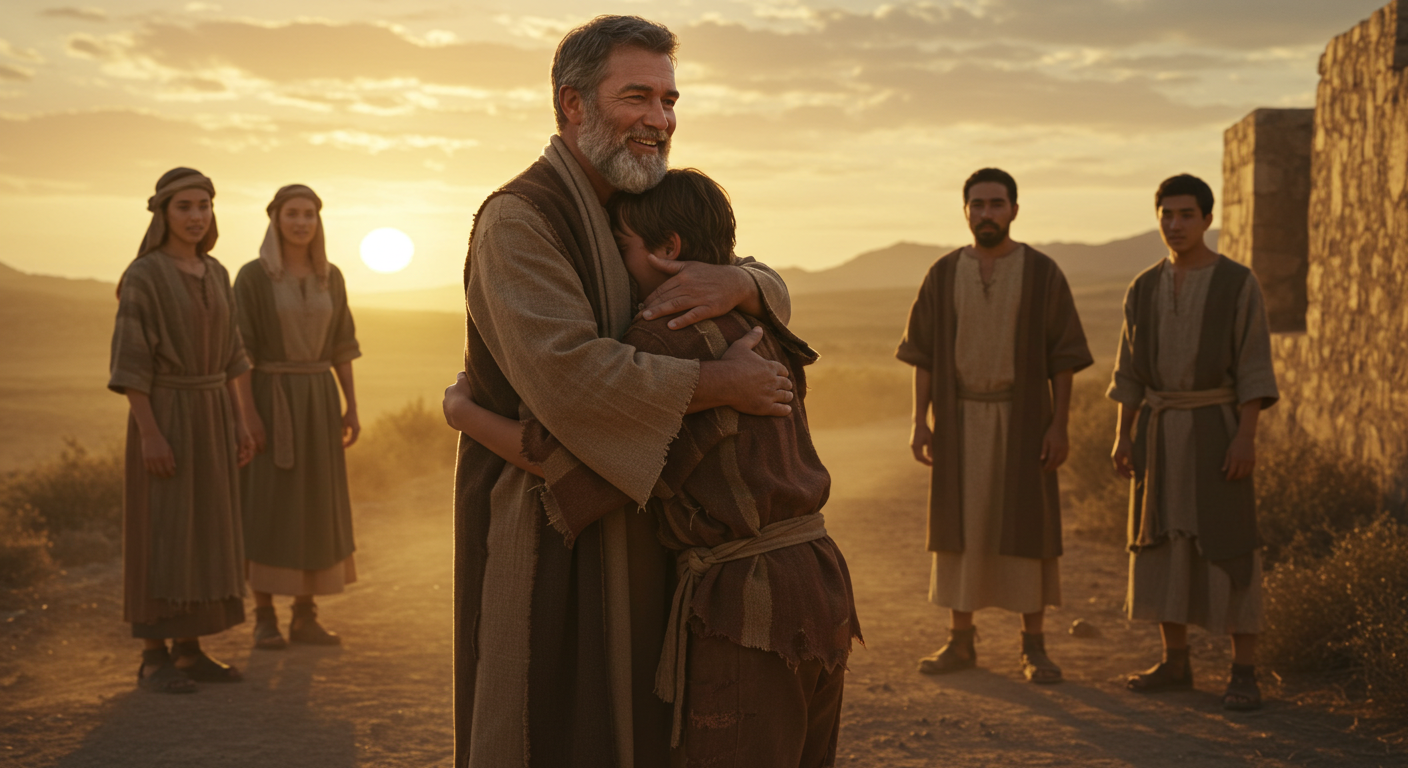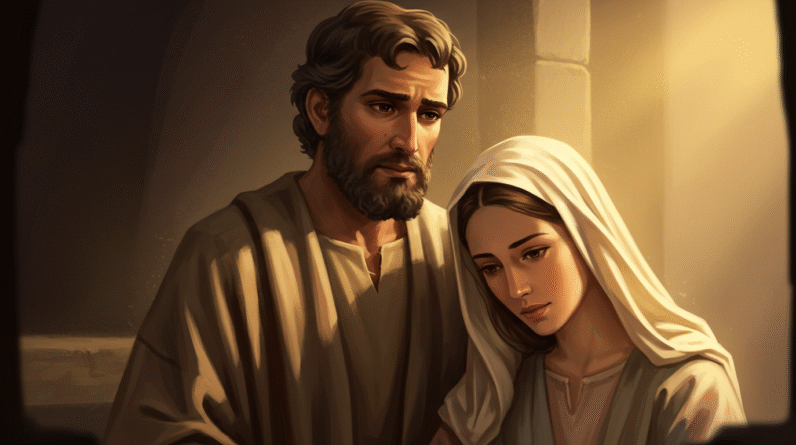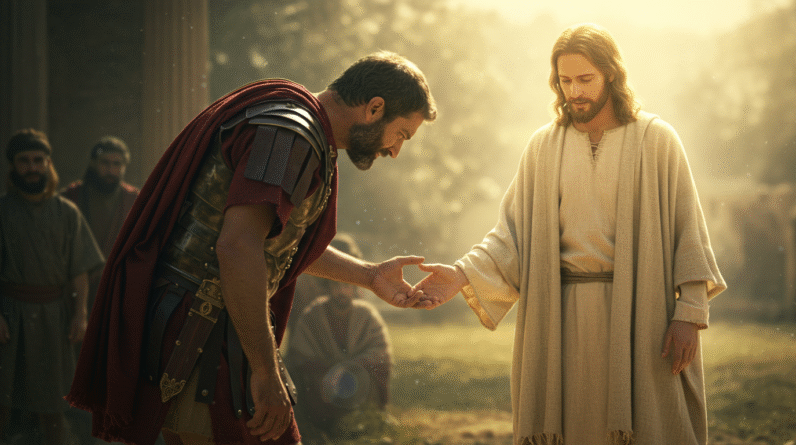The Prodigal Son: The Ultimate Portrait of a Father’s Forgiveness
If you’ve ever felt the pangs of regret, the mire of poor choices, or the yearning for understanding and acceptance, the parable of the Prodigal Son is a narrative that can find a tender spot in your heart. With tales of human error, divine love, and reconciliation, the story uncovers the depths of what it means to forgive with a purity that embodies the soul of compassion. Let’s delve deeper into how the Prodigal Son illustrates the encompassing concept of a father’s forgiveness and the intricate facets of human relationships.
The Wayward Journey Begins
To grasp the full significance of forgiveness in this story, let’s start from the beginning. In the parable, found in Luke 15:11-32, Jesus narrates a tale of a younger son who desires to leave his father’s home. Yearning for freedom and material pleasure, he demands his share of the inheritance prematurely. Imagine the scene: a mix of impulsiveness and youthful arrogance guiding his decision. It’s not some abstract folly but a relatable human craving for independence.
Exploring the Far Country
The younger son sets off for a distant country, far removed from the secure grasp of home. The very act of leaving signifies a break from the familial, a rupture in the expected line of honoring one’s parents. Abroad, he squanders his wealth in reckless living. Here lies the turning point, for many decisions driven by unchecked desire can lead to an inevitable downfall. The term “prodigal,” after all, embodies the idea of wastefulness — not just in wealth, but in time, opportunity, and relations forsaken in pursuit of fleeting joy.
The Pain of Realization
The story quickly bears down to the son’s moment of reckoning. A famine hits the land, and left penniless, he agrees to work in degrading conditions, feeding pigs — a task considered dishonorable for anyone, let alone someone of Jewish descent. It’s here, amid the mire, that he confronts the consequences of his choices. Hunger gnaws at him, not just physically, but spiritually. Sitting among the swine, he longs not for the lost riches but for the warmth of his father’s house.
A Decision to Return
It’s fascinating to contemplate the inner dialogue that drives the son to return home. This is more than an act of necessity; it’s an emotional reconciliation with himself and his identity. The son rehearses his apology, planning to plead for mere servanthood under his father’s roof. His condition is one of humility — an acknowledgment that he has sinned against heaven and his father.
The Essence of Repentance
This is repentance in its rawest form: a return to oneself and an acceptance of one’s limitations. Before forgiveness manifests externally, it runs deeper, carving paths within the heart of the penitent. How many times do we, much like the prodigal, find ourselves rehearsing the same apologies and vulnerable admissions in moments of personal crisis?

The Father’s Response: Unconditional Love
The story reaches its climax when the father sees his son from a distance, and instead of waiting, he runs to him. Picture this moment vividly: an elder, esteemed figure casting aside cultural convention, driven by a heart that beats only for his lost son. The act of running itself is laden with meaning; it speaks volumes of love that transcends mere obligation or societal expectation.
A Portrait of Joy and Embrace
In Luke 15:20, it is expressed so beautifully: “But while he was still a long way off, his father saw him and was filled with compassion for him; he ran to his son, threw his arms around him and kissed him.” This image of the father’s embrace portrays the essence of prodigal son forgiveness — it’s a celebration of reunion, an embodiment of joy so profound that it leaves behind the shadows of past transgressions.
The Restoration Ceremony
Even before the son can complete his confession, the father orders a celebration with the best robe, a ring, and sandals, symbolizing full restoration to the family. It is reassurance to the prodigal that his place is secured, not through merit, but through love. The most remarkable aspect here is the father’s refusal to dwell on his son’s mistakes; it highlights that forgiveness is not the end of a sentence but a key to a fresh beginning.
The Elder Son’s Reaction
Interestingly, the narrative does not conclude with this joyous celebration. The elder son, pious and steadfast, hears of the feast and feels anger and resentment. Consider his perspective: years of hard work and loyalty seemingly overshadowed by his brother’s reckless return. It’s here that the prodigal son forgiveness expands beyond a single character and becomes a challenge to broader understanding.
Addressing Resentment and Fairness
The elder son’s hesitance echoes a common struggle with perceived injustice — how can grace so easily eclipse wrongdoing? It raises the question: should acts of grace undermine or validate years of principled living? The father’s gentle reminder to his eldest accentuates that the joy of a family reunion eclipses the weight of fairness. In Luke 15:31-32, he reassures, “My son, you are always with me, and everything I have is yours. But we had to celebrate and be glad, because this brother of yours was dead and is alive again; he was lost and is found.”
Inner Conflict and Resolution
The dynamic between the father and his eldest son symbolizes the tension people experience in reconciling differing perceptions of justice and grace. The elder son’s reaction is a reflection of our trials with bitterness. By addressing his concerns, the father extends the story of forgiveness to different facets, emphasizing that true love is not limiting — it’s vast enough to hold different narratives together.
The Parable’s Underlying Themes
While on the surface, the prodigal son forgiveness highlights familial love, its intricate weave threads through several poignant morals and societal reflections.
Unveiling the Depths of Forgiveness
Forgiveness, as demonstrated by the father, is not conditional upon repentance or an apology. This parable reveals a heart so open that it mirrors divine love: boundless and lacking preconditions. The father’s decision to forgive represents a transformative power that not only rescues the individual but also uplifts the community.
The Role of Cultural and Social Constructs
The father’s actions subvert cultural norms. By choosing to run and embrace the son, he defies traditional expectations, thereby embodying the radical nature of authentic love. This subversion teaches that love and forgiveness must challenge social structures that confine relationships within rigid confines.
The Reawakening of Identity
At its core, the parable is an awakening — a call to remember who we are beneath our errors and lapses. The prodigal son’s return is not just geographical; it is a reconnection with his true self and values. The father’s acceptance helps reinforce this identity, bridging the gap between past mistakes and the potential for renewed purpose.
Personal Reflection and Application
Reflect on the ways the story resonates with relational rifts in your own life. Have there been instances where extending or receiving forgiveness changed the course of your relationships? In what ways can the essence of prodigal son forgiveness influence your interactions with others?
Forgiveness as a Transformational Journey
Understanding forgiveness as an ongoing journey rather than an endpoint can shift your perspective. Whether it’s the challenge of forgiving others or seeking forgiveness yourself, this process invites you to rise beyond ego and become grounded in empathy. The parable illustrates that everyone, whether the forgiven or the forgiving, undergoes a metamorphosis that shapes not just personal dynamics but also societal ideals.
Invoking Empathy and Compassion
In embracing the ethos of the prodigal son’s forgiveness, practice empathy towards those from whom you may be estranged. Often, underlying emotions are the true barriers. As the father showed, recognizing shared humanity and vulnerabilities can close distances previously thought impassable.
The Promise of Reconciliation
The promise that reconciliation holds should not be limited by our fears of rejection or failure. The father’s example encourages a proactive embrace of open communication, love, and vulnerability. If you’ve been hesitant, perhaps now is the time to break the silence in your own prodigal story, whatever role you find yourself in.
Final Thoughts
The parable of the Prodigal Son transcends its biblical origins, offering timeless lessons that touch on the fabric of forgiveness, grace, and family dynamics. It challenges you to practice a love without bounds, a forgiveness that does not calculate but liberates, and a celebration that cherishes unity over division. By internalizing the lessons of compassion and acceptance found herein, you’re prompted to act as conduits of grace in your own lives.
Explore More
For further reading and encouragement, check out these posts:
👉 7 Bible Verses About Faith in Hard Times
👉 Job’s Faith: What We Can Learn From His Trials
👉 How To Trust God When Everything Falls Apart
👉 Why God Allows Suffering – A Biblical Perspective
👉 Faith Over Fear: How To Stand Strong In Uncertain Seasons
👉 How To Encourage Someone Struggling With Their Faith
👉 5 Prayers for Strength When You’re Feeling Weak

📘 Jesus and the Woman Caught in Adultery – Grace and Mercy Over Judgement
A powerful retelling of John 8:1-11. This book brings to life the depth of forgiveness, mercy, and God’s unwavering love.
👉 Check it now on Amazon
As a ClickBank Affiliate, I earn from qualifying purchases.
Acknowledgment: All Bible verses referenced in this article were accessed via Bible Gateway (or Bible Hub).
“Want to explore more? Check out our latest post on Why Jesus? and discover the life-changing truth of the Gospel!”








